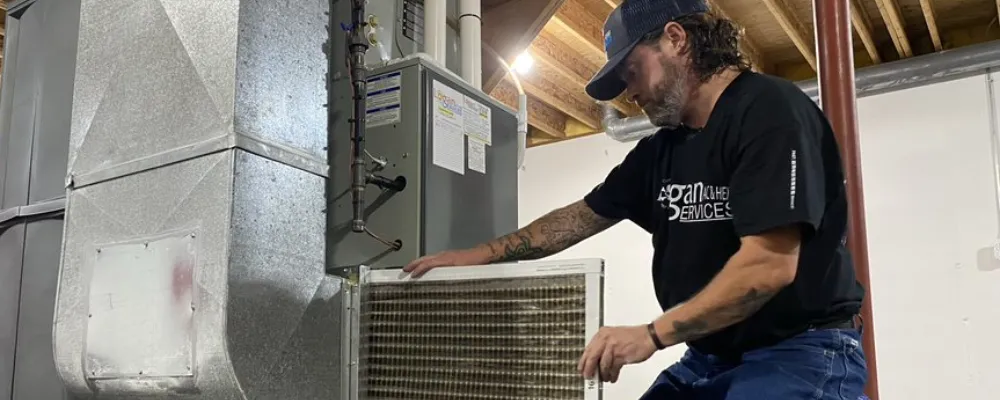Properly cleaning your air conditioner filter is essential for maintaining a healthy and efficient cooling system. In this article, we will discuss the importance of cleaning an air conditioner filter, the steps involved in the cleaning process, safety measures to consider, and tips for preserving the longevity of the filter.
Understanding the Importance of Cleaning an Air Conditioner Filter
The air conditioner filter is a crucial component of your AC unit designed to trap dust, pollen, and other airborne particles. Cleaning it not only helps to improve air quality in your home but also ensures that the air conditioning system operates smoothly and efficiently. Without regular cleanings, the air filter can accumulate dust and grime, straining the hvac system, degrading air quality, and increasing your utility bill significantly.
Why is a Clean AC Filter Important?
Having a clean AC filter is important for a number of reasons, including:
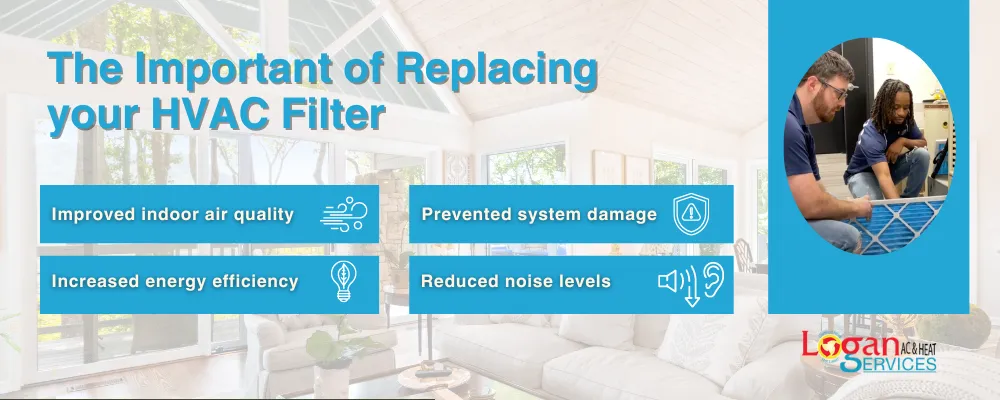
- Improved air quality. A clean filter helps to remove dust, pollen, and other pollutants from the air before it is circulated throughout your home. This can help to improve your indoor air quality and reduce your risk of allergies and respiratory problems.
- Increased efficiency. A dirty filter can restrict airflow, which can make your AC system work harder and less efficiently. This can lead to higher energy bills and a shorter lifespan for your AC system.
- Prevented damage. A dirty filter can also cause damage to your AC system. The filter can become so clogged that it restricts airflow to the point where the AC system overheats. This can damage the compressor and other components, leading to costly repairs.
- Reduced noise. A dirty filter can also make your AC system louder. This is because the AC system has to work harder to circulate air through a dirty filter.
The Repercussions of a Dirty Air Conditioner Filter
A dirty AC filter can cause a number of problems, including:
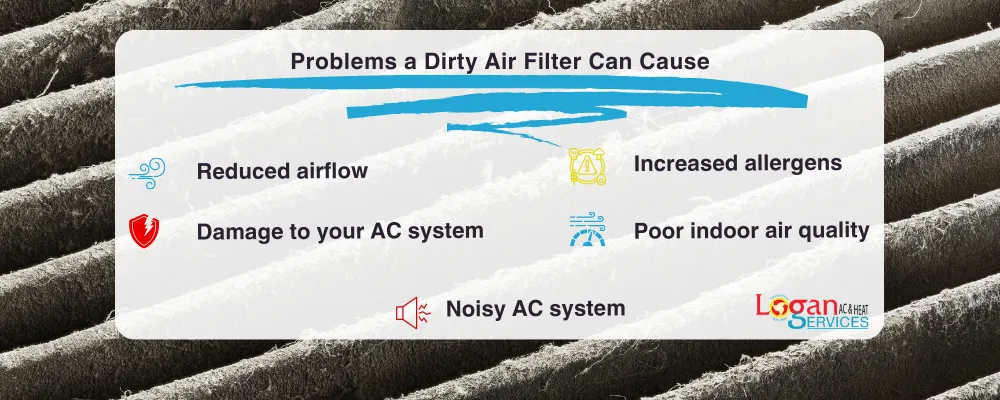
- Reduced airflow: A dirty filter can restrict airflow, which can make your AC system work harder and less efficiently. This can lead to higher energy bills and a shorter lifespan for your AC system.
- Increased allergens: A dirty filter can trap dust, pollen, and other allergens, which can worsen allergies and asthma symptoms.
- Damage to your AC system: A dirty filter can become so clogged that it restricts airflow to the point where the AC system overheats. This can damage the compressor and other components, leading to costly repairs.
- Poor indoor air quality: A dirty filter can allow pollutants to circulate throughout your home, which can reduce indoor air quality and increase your risk of respiratory problems.
- Noisy AC system: A dirty filter can also make your AC system louder. This is because the AC system has to work harder to circulate air through a dirty filter.
Essential Tools and Materials Needed for Cleaning
Cleaning a Filter can be one of the DIY projects homeowners can undertake. All you need is a soft cloth, a vacuum cleaner, warm water, and mild dish detergent. For replaceable AC filters, it’s essential to have the correct replacements available.
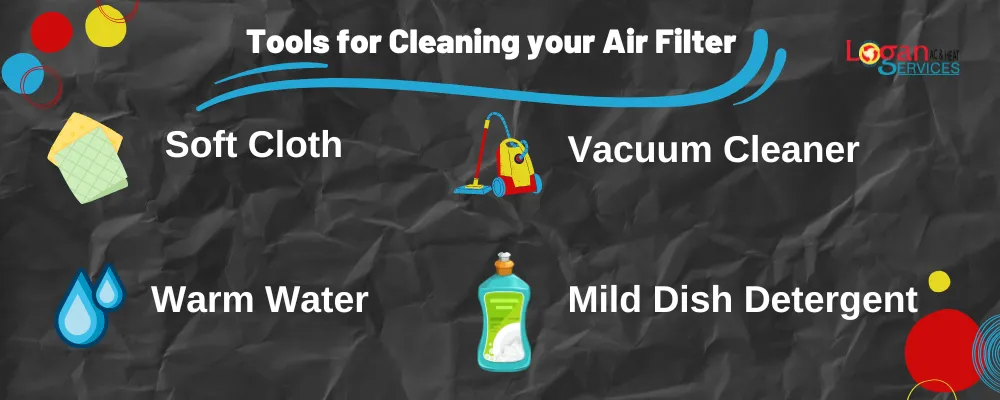
Detailed Steps for Cleaning an Air Conditioner Filter
Locating and Removing the Air Conditioner Filter
First, turn off your AC unit to ensure safety. The filter location varies depending on the type of air conditioner. For a central ac unit, the filter is usually located along the length of the return duct. For window air conditioners, it’s typically right behind the grill that faces into the room. After locating the filter, gently slide it out, ready for cleaning.
Techniques for Cleaning a Reusable Filter
For an air conditioner washable filter, start by softly vacuuming to remove loose dust and allergens. After removing the visible grime, wash the filter with warm water and a mild dish detergent solution to deep clean. Make sure not to scrub too hard to avoid damage to the delicate filter surfaces.
How to Clean Replaceable AC Filters
For non-washable, replaceable filters, avoid using any liquids. Lightly vacuum to remove dust or use a soft brush to gently knock off any dust particles. Once the filter has been cleaned, or in cases where cleaning is ineffective, replace it with a new one corresponding to the manufacturer’s guidelines.
Drying and Reinstalling the AC Filter
For reusable filters, ensure it’s complete dry before reinstallation. Once dry, slide the filter back into its designated slot in the hvac unit. Remember to reinstall correctly, often indicated by arrows on the filter sides showing direction of airflow. Once installed, you can turn the air conditioning unit back on, reveling in the enhanced air quality and efficient performance of the system.
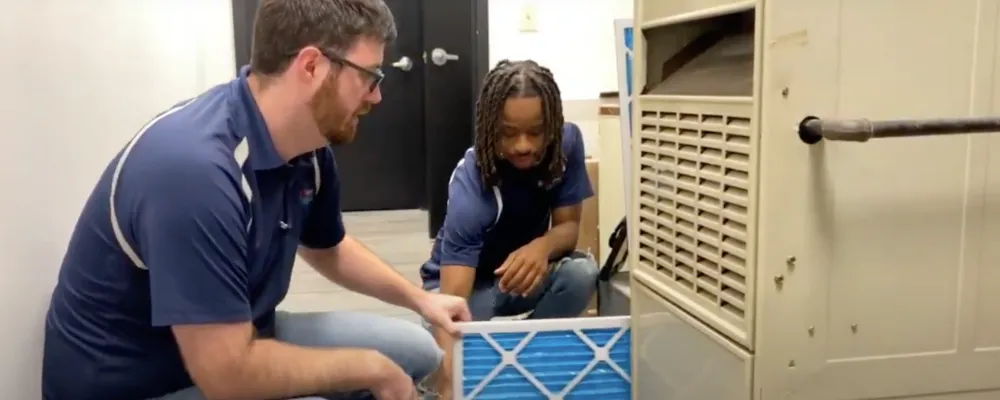
Safety Measures to Consider When Cleaning an Air Conditioner Filter
Personal Safety Precautions
Learning how to clean a filter doesn’t have to be challenging. It’s a fairly straightforward DIY project and a prerequisite step to maintaining an effective air conditioning system. First, always ensure you’re unplugged from the power source to avoid any electrical incidents. Donning gloves and eyewear also provides an extra layer of personal safety protection against dust and debris.
Environmental Safety Measures
Proper disposal of the dust and debris derived from your air conditioning units is equally crucial. Avoid disposing of a dusty air filter directly into the environment; opt for enclosed trash bags. It’s not only about cleaning; it’s about retaining our earth’s air quality, too.
Measures to protect the air conditioner unit itself
Before starting your cleaning process, it’s crucial to read the copyright holder’s instructions on your air conditioner’s user manual. Whether it’s a window filter or a central AC filter, each might require a unique cleaning approach.
Also, ensure that you handle the delicate condenser coils and other internal parts with utmost care. Mishandling could lead to a costly air condition repair.
Preserving the Longevity of the Air Conditioner Filter
Preventative Maintenance and Useful Tips
Regular air duct cleaning helps to enhance the lifespan of AC filters. A routine check every month, specifically during high usage seasons, is recommended.
If your AC is continuously run, or if you’ve pets, you may need to clean those filters more often. They also recommend replacing your air filters after every 90 days for optimum air conditioning.
When and How to Replace the Air Conditioner Filter
The frequency with which you should replace your AC filter depends on a number of factors, including:
- The type of filter you use. Higher MERV (minimum efficiency reporting value) filters are more effective at filtering out small particles, but they also tend to clog more quickly. If you use a higher MERV filter, you may need to change it more often.
- Your home’s air quality. If you live in a dusty or dirty area, you may need to change your filter more often.
- Your HVAC system’s usage. If you use your AC system frequently, you may need to change your filter more often.
- The age of your filter. Even if you don’t use your AC system frequently, the filter will eventually become dirty and clogged. It’s a good idea to change your filter at least once a year, even if it doesn’t appear to be dirty.
As a general rule of thumb, most experts recommend changing your AC filter every 30 to 90 days. However, if you live in a dusty or dirty area, or if you use your AC system frequently, you may need to change it more often.
Here are some signs that it’s time to replace your AC filter:
- Your AC system is not blowing as cold as it used to.
- Your AC system is making strange noises.
- Your AC system is not running as efficiently.
- Your filter is visibly dirty or clogged.
If you notice any of these signs, it’s a good idea to replace your AC filter. By replacing your filter regularly, you can help to keep your AC system running efficiently and extend its lifespan.
Here are the steps on how to replace your AC filter:
- Turn off your AC system. This will help to prevent any electrical shock.
- Locate the filter. The filter is usually located in the air handler, which is the part of the AC unit that is inside your home.
- Remove the old filter. There will usually be a latch or tab that you can use to remove the old filter.
- Inspect the old filter. If the old filter is dirty or clogged, you will need to replace it. If the old filter is clean, you can clean it and reuse it.
- Install the new filter. Make sure that the new filter is the correct size and type for your AC system.
- Turn on your AC system. Check for leaks around the filter. If you see any leaks, you will need to tighten the connections.
Frequently Asked Questions (FAQs) about Cleaning Your Air Conditioner Filters
It’s essential to understand the why’s and how’s of cleaning your air conditioner filters. This routine task can save you a hefty utility bill and prevent frequent revelations to your air condition repair team.
Why is it Necessary to Clean AC Filters?
Cleaning AC filters in your HVAC system is very important. Dusty air filters can restrict airflow, causing the air conditioning unit to work overtime to cool your space. Cleaning your dusty air filter not only increases your utility bill but also puts unnecessary strain on your HVAC unit.
How Often Should You Clean Your AC Filters?
Most air conditioning specialists recommend cleaning your AC filters at least once every 30-90 days. However, this varies depending on usage and environmental factors. For instance, if you live in an area with high levels of air pollution or if you frequently use your AC, it is advisable to clean your air filter more regularly.
What Steps Are Involved in Cleaning an Air Conditioner Filter?
Begin by turning off and unplugging your air conditioning unit. You would need to open the front panel and carefully remove the filter for a window AC filter. For HVAC units, the air filters are typically located in the return air duct or blower compartment.
Once you have your filter out, gently clean it with warm water and mild detergent. Use a soft brush to scrub away any stubborn dirt gently. Rinse thoroughly and allow the filter to dry completely before reinstalling it. Note that while some filters are reusable, others need to be replaced. Be sure to consult the manufacturer’s instructions.
When Should You Consider a Professional AC Unit Cleaning?
While DIY projects such as cleaning your AC filter can save you a bit of money, there are times when it’s best to call in the professional. This is particularly true if your air duct needs cleaning or if the condenser coils of your AC unit are dirty and hard to reach. If you notice a significant drop in your AC’s performance, it may be time to contact a professional air conditioning specialist.
Does Cleaning Your AC Filter Impact the Environment?
Indeed, it does. By maintaining a clean air conditioner filter, you not only improve the efficiency of your air conditioning system and save on your utility bill, but you also reduce your carbon footprint. A well-maintained HVAC system requires less energy to operate, reducing greenhouse gas emissions.
This article is protected by a Creative Commons License applied by the copyright holder and must not be copied without permission.

